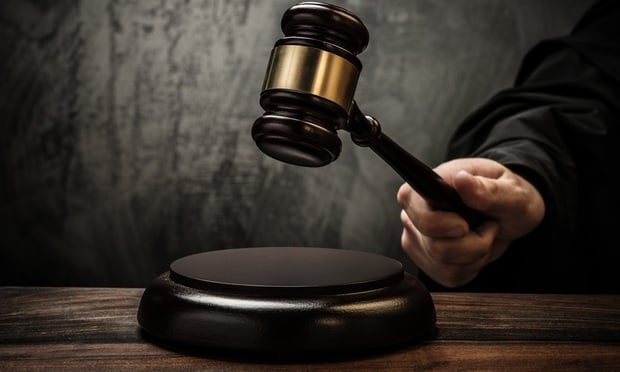Court: Students Facing Criminal Charges Lack Right to Counsel in Disciplinary Hearings
Students facing criminal charges do not have the right to have an attorney actively participate in related disciplinary hearings at their school, a Pennsylvania federal judge has determined, ruling on an issue unaddressed by the U.S. Court of Appeals for the Third Circuit.
March 21, 2018 at 04:39 PM
4 minute read

Students facing criminal charges do not have the right to have an attorney actively participate in related disciplinary hearings at their school, a Pennsylvania federal judge has determined, ruling on an issue unaddressed by the U.S. Court of Appeals for the Third Circuit.
U.S. District Judge Kim Gibson of the Western District of Pennsylvania ruled, in an opinion captioned Simms v. Pennsylvania State University-Altoona, that a policy barring a student's attorney from active participation in disciplinary hearings did not violate the student's due process rights. Gibson dismissed student Grace Simms' suit, which alleged the disciplinary proceedings violated her Fourteenth Amendment rights.
Simms argued that, because the school's policy did not allow her attorney to participate in the disciplinary hearing, she either had to testify at the hearing without counsel present, which could affect the criminal proceedings, or she had to remain silent during the proceeding. Gibson, however, reasoned that the school also had an interest in resolving disciplinary issues in an efficient and low-cost manner, and said the school's disciplinary proceedings met the requirements outlined in Penn State Altoona's student code of conduct.
“The court finds that any additional safeguards provided by allowing Simms' attorney to 'actively participate' in her hearing are outweighed by the administrative costs of requiring Penn State Altoona to make its student disciplinary procedures more adversarial, specialized and bureaucratic,” Gibson said.
Simms also argued she was subjected to racial bias. While Gibson tossed the discrimination claim, he reserved judgment about Simms' due process right to representation at the hearing. The court gave her two weeks to amend her complaint to include factual allegations that the school barred her lawyer from the hearings.
Gibson said the charges and disciplinary proceedings stemmed from an altercation that occurred in the university library between Simms and Sarah Ismail, who was also a Penn State Altoona student. Ismail, according to Simms' allegations, had started a cyberbullying campaign targeting her in March 2016. One of the alleged incidents included recording a “Snapchat story,” in which Ismail banged on Simms' door for about 10 minutes.
Later that night, according to the allegations, Simms went to the library and was told by another student that Ismail was also there. After approaching Ismail and asking her to delete the video, Ismail began yelling and swearing at Simms, according to the allegations. Ismail then attacked another student who had tried to calm her down, and Simms intervened to stop the fight, according to the allegations.
Police charged Simms with simple assault, conspiracy to commit disorderly conduct and harassment, and the school's student conduct office charged her with harassment and attempting to harm another.
Although she was allowed to prepare for the university disciplinary hearing with an attorney, the lawyer was not allowed to actively participate at the proceeding, Gibson said.
Simms chose to testify before the university tribunal, which decided to suspend her over the incident. The criminal charges were dropped a few months later.
Gibson noted that, although some district courts have addressed whether procedural due process gives an accused student the right to have counsel actively participate in disciplinary hearings, the Third Circuit has not faced the issue.
The district court cases, he said, have largely held that attorneys must be allowed to attend the hearings, but that there is no due process right for students to have their attorneys participate.
Steven Toprani of Dodaro Matta & Cambest in Pittsburgh represented Simms. He said that, given the number of students in the state and how prevalent this issues is becoming, the courts could use some clear guidance from the Third Circuit on the issue.
“I think this is an area that the court should address,” he said. “Particularly in cases like this where there are criminal prosecutions, the court should definitively state what role the lawyer has.”
James Horne of McQuaide Blasko, who represented Penn State Altoona, did not return a call for comment.
This content has been archived. It is available through our partners, LexisNexis® and Bloomberg Law.
To view this content, please continue to their sites.
Not a Lexis Subscriber?
Subscribe Now
Not a Bloomberg Law Subscriber?
Subscribe Now
NOT FOR REPRINT
© 2025 ALM Global, LLC, All Rights Reserved. Request academic re-use from www.copyright.com. All other uses, submit a request to [email protected]. For more information visit Asset & Logo Licensing.
You Might Like
View All
Superior Court Rejects Pa. Hospital's Challenge to $7.3M Med Mal Judgment
3 minute read
Pittsburgh Judge Rules Loan Company's Online Arbitration Agreement Unenforceable
3 minute read
Pa. High Court to Weigh Parent Company's Liability for Dissolved Subsidiary's Conduct
3 minute read
Trending Stories
- 1Meet the New President of NY's Association of Trial Court Jurists
- 2Lawyers' Phones Are Ringing: What Should Employers Do If ICE Raids Their Business?
- 3Freshfields Hires Ex-SEC Corporate Finance Director in Silicon Valley
- 4Meet the SEC's New Interim General Counsel
- 5Will Madrid Become the Next Arbitration Hub?
Who Got The Work
J. Brugh Lower of Gibbons has entered an appearance for industrial equipment supplier Devco Corporation in a pending trademark infringement lawsuit. The suit, accusing the defendant of selling knock-off Graco products, was filed Dec. 18 in New Jersey District Court by Rivkin Radler on behalf of Graco Inc. and Graco Minnesota. The case, assigned to U.S. District Judge Zahid N. Quraishi, is 3:24-cv-11294, Graco Inc. et al v. Devco Corporation.
Who Got The Work
Rebecca Maller-Stein and Kent A. Yalowitz of Arnold & Porter Kaye Scholer have entered their appearances for Hanaco Venture Capital and its executives, Lior Prosor and David Frankel, in a pending securities lawsuit. The action, filed on Dec. 24 in New York Southern District Court by Zell, Aron & Co. on behalf of Goldeneye Advisors, accuses the defendants of negligently and fraudulently managing the plaintiff's $1 million investment. The case, assigned to U.S. District Judge Vernon S. Broderick, is 1:24-cv-09918, Goldeneye Advisors, LLC v. Hanaco Venture Capital, Ltd. et al.
Who Got The Work
Attorneys from A&O Shearman has stepped in as defense counsel for Toronto-Dominion Bank and other defendants in a pending securities class action. The suit, filed Dec. 11 in New York Southern District Court by Bleichmar Fonti & Auld, accuses the defendants of concealing the bank's 'pervasive' deficiencies in regards to its compliance with the Bank Secrecy Act and the quality of its anti-money laundering controls. The case, assigned to U.S. District Judge Arun Subramanian, is 1:24-cv-09445, Gonzalez v. The Toronto-Dominion Bank et al.
Who Got The Work
Crown Castle International, a Pennsylvania company providing shared communications infrastructure, has turned to Luke D. Wolf of Gordon Rees Scully Mansukhani to fend off a pending breach-of-contract lawsuit. The court action, filed Nov. 25 in Michigan Eastern District Court by Hooper Hathaway PC on behalf of The Town Residences LLC, accuses Crown Castle of failing to transfer approximately $30,000 in utility payments from T-Mobile in breach of a roof-top lease and assignment agreement. The case, assigned to U.S. District Judge Susan K. Declercq, is 2:24-cv-13131, The Town Residences LLC v. T-Mobile US, Inc. et al.
Who Got The Work
Wilfred P. Coronato and Daniel M. Schwartz of McCarter & English have stepped in as defense counsel to Electrolux Home Products Inc. in a pending product liability lawsuit. The court action, filed Nov. 26 in New York Eastern District Court by Poulos Lopiccolo PC and Nagel Rice LLP on behalf of David Stern, alleges that the defendant's refrigerators’ drawers and shelving repeatedly break and fall apart within months after purchase. The case, assigned to U.S. District Judge Joan M. Azrack, is 2:24-cv-08204, Stern v. Electrolux Home Products, Inc.
Featured Firms
Law Offices of Gary Martin Hays & Associates, P.C.
(470) 294-1674
Law Offices of Mark E. Salomone
(857) 444-6468
Smith & Hassler
(713) 739-1250





